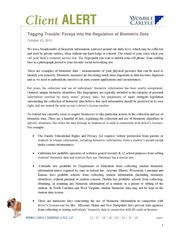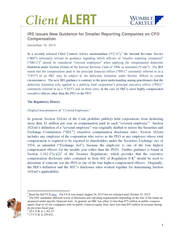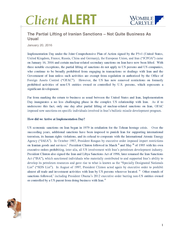"Defend Trade Secrets Act" - How Will This New Law Affect Your Business? – May 3, 2016
Womble Carlyle Sandridge & Rice
Description
In addition to the traditional remedies provided by state laws, such as monetary damages and injunctive
relief, the DTSA authorizes courts in “extraordinary circumstances” to issue a seizure order that can be
enforced by federal, state, or local law enforcement, without notice to the defendant. To prevent abuse of
seizure orders, the DTSA contains a list of requirements that must be met before a court can issue such
an order. The DTSA also provides for the imposition of a reasonable royalty for ongoing
misappropriation if an injunction is “inequitable.” The way courts interpret these provisions will be
something to monitor as businesses consider whether to file a misappropriation action in federal or state
court.
With trade secret misappropriation claims moving to federal court, related claims such as breach of
employment contracts will likely follow. In order to prevent employers from using the DTSA to prevent
employees from unreasonably moving to a competitor, the DTSA contains provisions that guide courts
away from injunctive relief that would prevent a former employee from joining a competitor based on
the information known by the employee.
Instead, any such injunction must be based on a threat of actual trade secret misappropriation. Further, the DTSA provides that any injunction against a former employee must not conflict with any state law that “prohibit[s] restraints on the practice of a lawful profession, trade, or business.” The DTSA also contains a public policy provision that provides immunity to “whistleblowers” from DTSA claims if an employee discloses a company’s trade secrets when reporting a violation of law. The DTSA requires that companies provide notice of this immunity in employment contracts, non-disclosure agreements, and related agreements.
The failure to provide notice bars companies from recovering exemplary damages or attorneys’ fees under the DTSA. Companies should thus consider including such notices upon the DTSA becoming effective. The DTSA will provide a potentially powerful new cause of action in misappropriation cases. Its use should be considered carefully along with traditional state causes of action.
Womble Carlyle will continue to monitor the implementation of the DTSA. For assistance with updating employment contracts and other agreements to include the “whistleblower” notice, please contact one of the client alert authors. Contact Information If you have any questions about this update, please contact client alert authors Jacob Wharton at 336.747.6609 or JWharton@wcsr.com, John Morrow at 336.721.3584 or JMorrow@wcsr.com, or the Womble Carlyle Intellectual Property attorney with whom you normally work. __________________ Womble Carlyle client alerts are intended to provide general information about significant legal developments and should not be construed as legal advice regarding any specific facts and circumstances, nor should they be construed as advertisements for legal services. 2 .
Instead, any such injunction must be based on a threat of actual trade secret misappropriation. Further, the DTSA provides that any injunction against a former employee must not conflict with any state law that “prohibit[s] restraints on the practice of a lawful profession, trade, or business.” The DTSA also contains a public policy provision that provides immunity to “whistleblowers” from DTSA claims if an employee discloses a company’s trade secrets when reporting a violation of law. The DTSA requires that companies provide notice of this immunity in employment contracts, non-disclosure agreements, and related agreements.
The failure to provide notice bars companies from recovering exemplary damages or attorneys’ fees under the DTSA. Companies should thus consider including such notices upon the DTSA becoming effective. The DTSA will provide a potentially powerful new cause of action in misappropriation cases. Its use should be considered carefully along with traditional state causes of action.
Womble Carlyle will continue to monitor the implementation of the DTSA. For assistance with updating employment contracts and other agreements to include the “whistleblower” notice, please contact one of the client alert authors. Contact Information If you have any questions about this update, please contact client alert authors Jacob Wharton at 336.747.6609 or JWharton@wcsr.com, John Morrow at 336.721.3584 or JMorrow@wcsr.com, or the Womble Carlyle Intellectual Property attorney with whom you normally work. __________________ Womble Carlyle client alerts are intended to provide general information about significant legal developments and should not be construed as legal advice regarding any specific facts and circumstances, nor should they be construed as advertisements for legal services. 2 .













